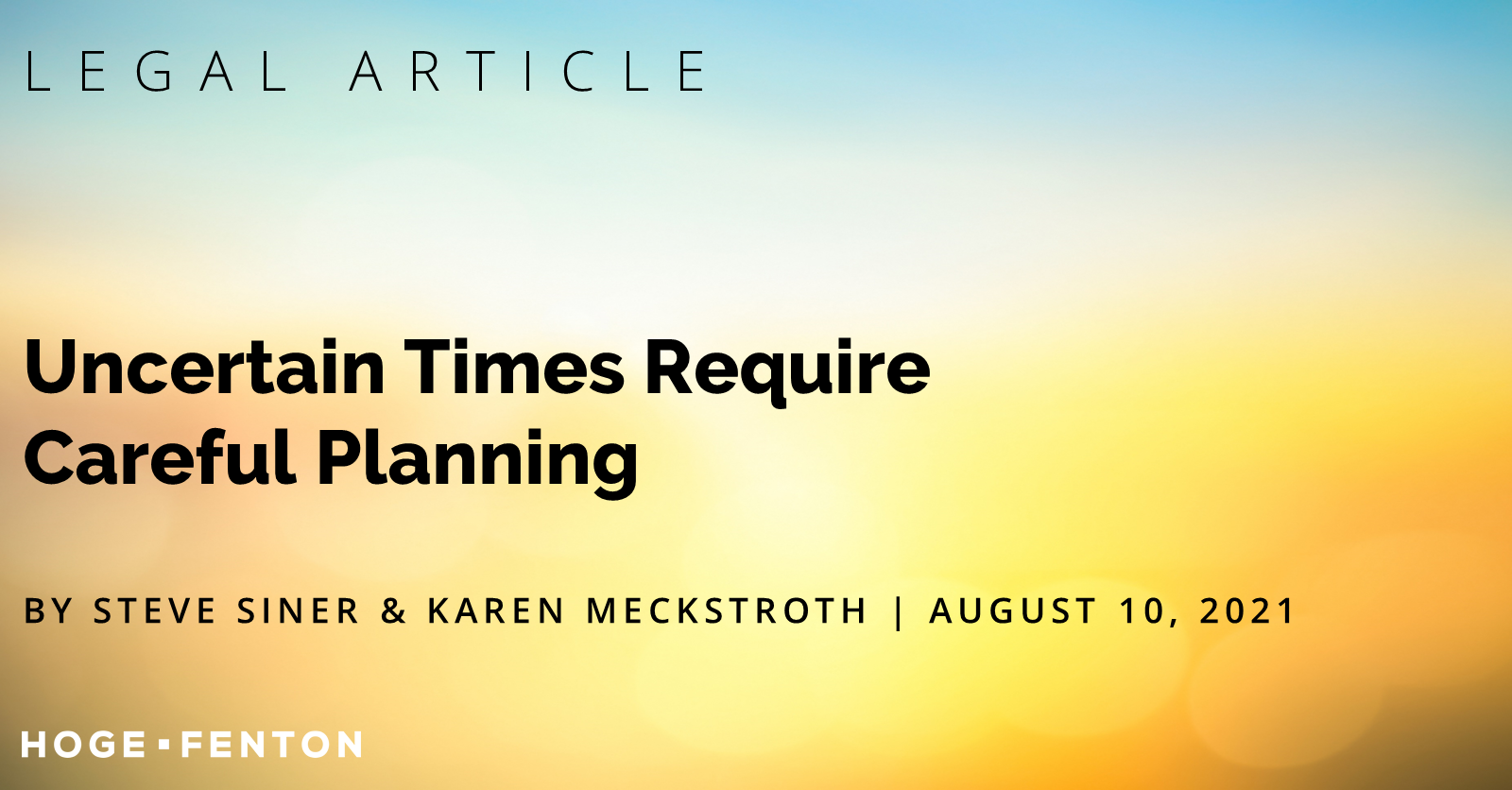Legal Article | Uncertain Times Require Careful Planning
By Hoge Fenton | 08.10.2021 | Estates and Trusts

You may have heard the buzz on the news, read about it in the paper, or heard friends talk about it on a Zoom call: something is happening in Washington that may change the federal estate tax laws this year.
The last two decades have been a roller coaster of change in the world of federal estate tax (or, as some call it, the “death tax”). The amount that an individual can pass free of estate tax on death has risen from $675 thousand (2001) to $5 million (2011) to $11.7 million (2021). The current tax exemption is set to expire after 2025, after which time the tax exemption will revert to $5 million. Congress can act to change substantive tax law, including the federal estate tax exemption amount: new tax legislation can be enacted by a simple majority vote via reconciliation. There are bills in the Senate that propose reducing the federal estate tax exemption to $3.5 million (effective January 1, 2022) and raising the top marginal federal estate tax rate to 65%. In addition, there are proposals in these bills that affect many estate planning tools and techniques.
For some, it makes sense to consider making significant lifetime gifts to minimize taxes before changes are enacted. Gifting to irrevocable trusts for the benefit of children, nieces, nephews, parents, and others can be a powerful technique to remove assets from the donor’s taxable estate. But the tax benefits come at a cost: loss of control. These irrevocable trusts are different from the revocable living trusts that form the foundation of most individual’s estate planning. A revocable living trust can be amended and revoked. When you make a gift of your assets through an irrevocable trust, you must relinquish sufficient control over the operation of the trust and the terms of the trust to avoid the catastrophic outcome of the assets being counted in your taxable estate on death.
So how do you approach gifting millions of dollars of your assets to an irrevocable and unamendable trust now, when we don’t know what Congress is going to do in the future? What if the tax law changes in a way that the irrevocable trust isn’t “built” to handle? How can you avoid the catastrophic scenario of bringing the assets back into your taxable estate?
On one hand, “irrevocable” does not necessarily mean “unalterable.” The California Probate Code and case law recognize certain methods to change an irrevocable trust. On the other hand, when you want to modify the terms of an irrevocable trust when Congress changes the federal tax laws, you are operating not just under the California Probate Code and case law, but federal law as well. The United States Supreme Court held that federal authorities are not bound by state court orders. (Commissioner v. Estate of Bosch, 387 U.S. 456 (1967)). In other words, even though the California Probate Court grants an order that modifies the terms of an irrevocable trust, the IRS and the federal courts can reach their own conclusions. If an event has already occurred that entitles the federal government to tax revenue (such as the death of the settlor), it is unlikely that a modification after the event will be respected for federal tax purposes (Revenue Ruling 93-79, 1993-2 C.B. 269).
Rather than relying on a future modification of the irrevocable trust, there are other techniques that could increase the adaptability of the trust to future circumstances. Think of drafting a trust like building a machine: a skilled drafter can create the trust with functions that may or may not be used in the future. These functions can be formulas that will adapt to future circumstances, or people with special powers (such as “trust protectors”) to effect change in the future. In the estate planning world, we refer to this as “building flexibility” into a trust. Building flexibility into an irrevocable trust is a complex undertaking that requires time. For that reason, we recommend that clients start the process sooner rather than later.
In addition to building flexibility, another approach is to establish irrevocable trust now, but to delay funding the trust until future tax laws become clear. An alternative to this approach is to establish an irrevocable trust, fund the trust, and include the ability for the assets in the trust to be “disclaimed” within nine months of funding. This, too, “buys time” to see what tax law changes occur.
As in all cases of prudent estate planning, the key is to be thoughtful and careful. Each person’s situation is different, and no one size fits all. We are a team of sophisticated estate planners and tax strategists who work to accomplish your tax planning goals while passing your assets in a meaningful way to the people and causes that that are important to you.
Meet Our Team
 |
Steven D. Siner is a member of the Corporate, Real Estate, and Estates and Trusts groups and has served as Hoge Fenton’s Managing Shareholder. For over 35 years, he has represented companies and individuals in myriad business, real estate, and wealth management matters. His typical clients are high net worth individuals, business owners looking to start, grow, sell, or merge their companies, and owners of commercial properties. |
This information is provided as an educational service by Hoge Fenton for clients and friends of the firm. This communique is an overview only, and should not be construed as legal advice or advice to take any specific action. Please be sure to consult a knowledgeable professional for assistance with your particular legal issue. © 2021 Hoge Fenton










